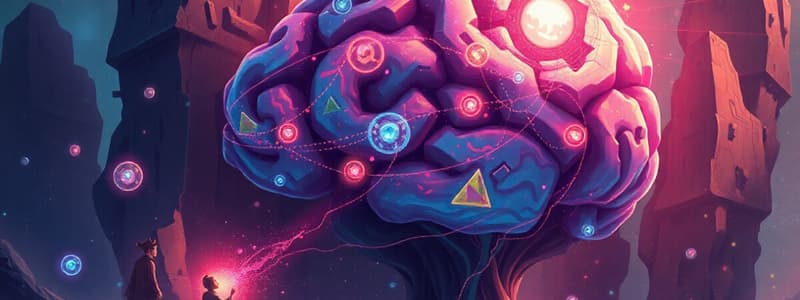Podcast
Questions and Answers
What fundamentally differentiates System 1 thinking from System 2 thinking?
What fundamentally differentiates System 1 thinking from System 2 thinking?
- System 1 requires more cognitive effort.
- System 1 relies solely on logic.
- System 1 is fast and automatic. (correct)
- System 1 is used for complex tasks.
How does the process of problem-solving using heuristics typically differ from using algorithms?
How does the process of problem-solving using heuristics typically differ from using algorithms?
- Heuristics provide a step-by-step procedure.
- Heuristics require more cognitive attention.
- Heuristics are faster but not always accurate. (correct)
- Heuristics are generally more accurate than algorithms.
What is the role of schemas in cognitive processing?
What is the role of schemas in cognitive processing?
- Schemas increase mental effort needed to process information.
- Schemas connect and reduce mental effort in understanding concepts. (correct)
- Schemas are solely visual representations.
- Schemas hinder organizational capabilities.
What physiological changes might occur when engaging System 2 thinking?
What physiological changes might occur when engaging System 2 thinking?
Which of the following statements best describes the relationship between mental imagery and actual sensory experience?
Which of the following statements best describes the relationship between mental imagery and actual sensory experience?
Which heuristic involves judging the frequency of an event based on how easily examples come to mind?
Which heuristic involves judging the frequency of an event based on how easily examples come to mind?
What is the primary characteristic of confirmation bias?
What is the primary characteristic of confirmation bias?
Which problem-solving method is characterized by the use of sudden insights or 'Ah-ha!' moments?
Which problem-solving method is characterized by the use of sudden insights or 'Ah-ha!' moments?
Which definition best describes 'General Intelligence' (g)?
Which definition best describes 'General Intelligence' (g)?
What best defines a prototype in cognitive categorization?
What best defines a prototype in cognitive categorization?
What does an IQ score of 100 indicate?
What does an IQ score of 100 indicate?
What type of thinking is characterized as needing focus and is typically used for more complex tasks?
What type of thinking is characterized as needing focus and is typically used for more complex tasks?
What do twin studies suggest about the influence on IQ?
What do twin studies suggest about the influence on IQ?
Which of the following best describes concepts in cognitive psychology?
Which of the following best describes concepts in cognitive psychology?
Which type of intelligence primarily pertains to problem-solving and abstract thinking?
Which type of intelligence primarily pertains to problem-solving and abstract thinking?
In problem-solving, what is a primary disadvantage of using heuristics?
In problem-solving, what is a primary disadvantage of using heuristics?
What aspect of intelligence is argued to be neglected by traditional IQ tests according to Sternberg?
What aspect of intelligence is argued to be neglected by traditional IQ tests according to Sternberg?
What is a key advantage of using algorithms in problem-solving?
What is a key advantage of using algorithms in problem-solving?
Emotional intelligence can best be defined as the ability to:
Emotional intelligence can best be defined as the ability to:
When using the representativeness heuristic, a person might mistakenly assume someone with glasses and a book is a librarian because:
When using the representativeness heuristic, a person might mistakenly assume someone with glasses and a book is a librarian because:
Study Notes
Computational Theory of Mind
- Cognitive science views the brain as an information-processing device.
- Input is processed and results in an output.
- Example: Seeing a red light triggers a brain process that results in the output of pressing the brake.
Thinking and Mental Imagery
- Mental imagery is the ability to create visual or auditory representations in the mind without external stimuli.
- The brain activates the same areas for both real and imagined experiences.
Schemas, Concepts, and Prototypes
- Concepts are mental categories that organize and simplify the world.
- Prototypes are the most typical examples of a concept.
- Schemas are networks of interconnected concepts that help process information efficiently.
How We Solve Problems
- Heuristics: Fast mental shortcuts that may not always be accurate.
- Algorithms: Step-by-step procedures that are reliable if applied correctly.
- Insight: Sudden realizations that lead to creative solutions.
Dual Systems of Thinking
- System 1: Fast, automatic, and effortless thinking used for quick judgments.
- System 2: Slow, deliberate, and effortful thinking used for complex tasks.
Heuristics
- Availability Heuristic: Judging the frequency of an event based on how easily it comes to mind.
- Representativeness Heuristic: Categorizing something based on how closely it fits a prototype.
- Confirmation Bias: Focusing on information that confirms existing beliefs and ignoring contradictory information.
Intelligence
- General Intelligence (g): A single factor thought to underlie all cognitive abilities.
- IQ (Intelligence Quotient): Measures "mental age" relative to "chronological age," with 100 representing average.
- Binet’s IQ Test: Developed to identify children needing special education.
Environmental Influence on IQ
- Genetics and environment both influence IQ.
- Identical twins raised together have very similar IQ scores, highlighting the strong genetic influence.
- Non-twin siblings raised together have lower IQ correlations, demonstrating the impact of environment.
Sternberg’s Triarchic Theory of Intelligence
- Analytical Intelligence: Problem-solving and abstract thinking.
- Practical Intelligence: Ability to handle everyday tasks and adapt to new situations.
- Creative Intelligence: Ability to come up with novel solutions.
Emotional Intelligence
- Ability to understand and manage emotions.
- Components include self-awareness, self-regulation, empathy, and social skills.
Studying That Suits You
Use AI to generate personalized quizzes and flashcards to suit your learning preferences.
Related Documents
Description
Explore the fascinating aspects of cognitive science, including how the brain processes information, mental imagery, and the role of schemas in problem-solving. This quiz will test your understanding of heuristics, algorithms, and insights, enabling you to better grasp the complexities of human thought.


